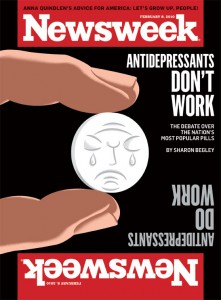5 Myths About Unipolar Depression
 Early this year, news stories such as Newsweek’s “The Depressing News About Antidepressants” and “Antidepressant Drug Effects and Depression Severity” in the Journal of the American Medical Association (JAMA) created an inadequate picture of the seriousness of clinical depression, and the importance of preventing recurrent episodes with long-term antidepressant treatment. (For a rebuttal, see Psychiatric Times.)
Early this year, news stories such as Newsweek’s “The Depressing News About Antidepressants” and “Antidepressant Drug Effects and Depression Severity” in the Journal of the American Medical Association (JAMA) created an inadequate picture of the seriousness of clinical depression, and the importance of preventing recurrent episodes with long-term antidepressant treatment. (For a rebuttal, see Psychiatric Times.)
The consequences of this distorted depiction of depression and its treatment are potentially dire for individuals’ health. Some of the popular myths about depression deserve critical review so that patients can make more informed decisions about their own treatment.
Myth 1: Depression is all in your mind
Myth 2: Depression is over-treated
Myth 3: Antidepressant efficacy barely exceeds that of placebo
Myth 4: Antidepressants should be stopped as soon as possible
Myth 5: Depression is a minor medical problem
Myth 1: Depression is all in your mind
This might seem valid, since depression is classified as a mental illness. But depression is not abstract, imaginary, or lacking a solid physical foundation. There is now overwhelming evidence that depression coincides with disturbances in multiple brain and body systems.
Numerous brain imaging studies have found that during depressive episodes, neural activity in the prefrontal cortex decreases in proportion to the severity of the depression, while overactivity occurs in several parts of the emotional brain, such as the amygdala. Meta-analyses indicate there is also a significant reduction in hippocampal volume during depression, and consistent abnormalities in physiology, the endocrine system, inflammatory cytokines, and blood levels of neuroprotective factors such as brain-derived neurotrophic factor (BDNF), which helps keep nerve cells healthy and is necessary for normal long-term memory.
Thus, depression is a disorder of the brain and body with potentially lethal consequences (both increased risk of suicide and marked increases in medical mortality).
Myth 2: Depression is over-treated
The large increases in prescriptions for antidepressants in the U.S. and England could suggest overtreatment. However, the facts are otherwise; depression is under-treated. Some 30% to 40% of major depressions are not treated at all, either with psychotherapy or with medications. Evidence indicates that there is a “cohort effect” in the U.S., such that every generation (birth cohort) since World War I has had a higher incidence of depression and an earlier age of onset.
Even when depression is treated, many patients stop their medication prematurely and risk early relapse, and those with recurrent depression often fail to maintain long-term preventive treatment.
Myth 3: Antidepressant efficacy barely exceeds that of placebo
The meta-analysis published by JAMA claimed that the overall effect of antidepressant medication was weak, and that antidepressants failed to perform significantly better than placebo in milder forms of depression. However, of the hundreds of placebo-controlled studies of antidepressants in the literature, only 6 studies were analyzed in this meta-analysis, and two of these utilized sub-optimal doses of the antidepressant imipramine. Additionally, the meta-analysis excluded data from studies in which patients who responded to placebo were weeded out in an early stage. This may have artificially removed the difference between antidepressants and placebo in this meta-analysis.
Unfortunately the explosive promulgation of this article as a “new discovery” obscures the real story about the effectiveness of antidepressants in long-term prevention.
Myth 4: Antidepressants should be stopped as soon as possible
For patient with a history of two or three prior major depressions, antidepressant treatment should be maintained in the long term for prevention of future depressions. In 1992, John Davis analyzed studies in which people who were better on antidepressants were randomized on a double-blind basis to either continue the antidepressant or substitute it with a placebo. Maintaining antidepressant treatment cut the risk of a recurrence by about half—a huge effect—and the chances that the findings were due to chance (random variation) was statistically minute (p<10-34). Similar studies after 1992 also concluded that antidepressants markedly prevent future depressions (by 70% compared to placebo).
Antidepressants may also help protect the brain. They increase BDNF directly, prevent stress from decreasing BDNF in the hippocampus, and also increase the number of new neurons made daily. Yvette Sheline from St. Louis found that people treated with antidepressants more of the time did not exhibit decreases in hippocampal volume (as measured via MRI) as did people treated with antidepressants less of the time.
Myth 5: Depression is a minor medical problem
Depression is one of the top causes of disability worldwide, even more problematic than cardiovascular disease. It not only can impair patients’ performance in the arenas of academics, social life, and employment, but it is also associated with a 10-15% lifetime risk of suicide. In addition, if depression goes untreated, an individual can lose a decade or more life expectancy, primarily through the association between depression and cardiovascular disease.
If you or a family member has experienced recurrent depressions, talk to your doctor about antidepressants. Life long treatment of high blood pressure and cholesterol is a widely accepted public health strategy for those at risk for another heart attack. Depression deserves the same attention in those with recurrent episodes.
A quick screening for depression, anxiety, PTSD, and bipolar disorder is available at mymoodmonitor.com.
This validated scale will provide the likelihood of a diagnosis for these conditions and allow for continuing followup to assess symptom improvement.
Comments
Leave a Reply

